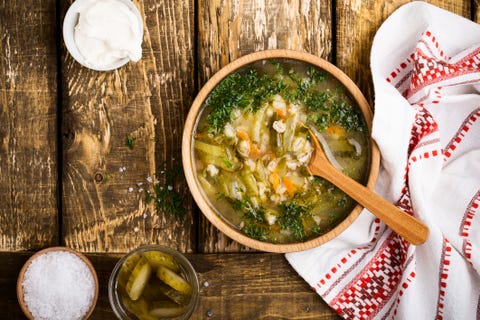
[ad_1]

Andrey ZhuravlevGetty Images
Who doesn’t love a thick, steamy bowl of mushroom-barley soup? There’s a good reason to slurp it down, besides the yum factor: Barley, one of those ancient grains we’ve been hearing so much about, has a host of health benefits.
You can find barley in a range of forms: not just the most-familiar pearled barley (made famous in that mushroom-barley soup), but also barley flour, flakes, grits, and more. Like other whole grains, it’s super-good for you—in fact, epidemiological studies have linked eating barley with the potential to reduce the risk of certain diseases.
First, is barley better for you than rice?
Barley and brown rice both have their benefits. If you’re avoiding gluten, then brown rice should be your go-to, because barley has gluten. When it comes to folate and vitamin E, brown rice wins; but barley takes the trophy for fiber (it has much, much more) and calcium.
Beyond this, what are the specific health powers of barley? More research is needed, but here’s what the science is showing about the benefits of barley:
Barley is a good source of fiber.
Barley is a delicious way to up your fiber content. “And fiber has a range of health benefits, from supporting healthy digestion to helping with weight loss by enhancing satiety to promoting better glycemic control,” says Stefani Sassos MS, RDN, the registered dietician with the Good Housekeeping Institute. Among whole grains, barley is one of the best sources of fiber, and it happens to be a type of fiber that’s especially healthy: just one cup of pearled barley has 6 grams of fiber, and only 193 calories. Along with that fiber, barley also has 3.5 grams of protein—not anywhere close to the amount in other whole grains like quinoa, kamut, or teff, but it’s something.
Barley gives you a nice dose of vitamins and minerals.
Barley has a good amount of several different nutrients that help keep your body humming. It has niacin, a B vitamin that our body uses to turn food into energy; niacin is also key for our nervous and digestive systems and for the health of our skin. Barley is a good source of another B vitamin, B6, which helps our brains and our immune systems. The grain is mineral-rich, as well. Barley provides a big dose of manganese (an essential nutrient that helps to keep our body running), selenium (important for a healthy thyroid), and phospherous (for healthy bones and teeth, among other things), as well as a decent amount of iron.
Barley is high in phytochemicals.
Phyto-whats?! These substances are, simply, chemicals found in plants (“phyto” means plant). There are thousands and thousands of different types, and scientists know less about them than they know about vitamins and minerals — but they have figured out that they may be one of the things in plants that help prevent diseases like heart disease and cancer. And researchers have found that barley is rich a few different types.
Barley may protect against heart disease.
Barley contains flavonoids, which are among the more highly-researched phytochemicals. Flavonoids are the substance in whole grains that’s thought to help protect against heart disease, and even cancer. Blue and purple barley grains have the highest amount of flavonoids among the different barley varieties.
Barley might help protect against stroke.
More research is needed on this, but among whole grains, barley is one of the best sources of a phytochemical called tocols, which has been reported to have antioxidant properties, and has been found to potentially reduce the risk of stroke.
Barley may help reduce cholesterol.
Again, more research is needed, but barley has a phytochemical called phytosterols. These are found in other whole grains (barley has less of it than some other varieties). It’s thought to be responsible for whole grain’s potential for lowering cholesterol.
Barley may contain powerful lignons.
Lignons are a phytochemical that are thought to have a superhero’s level of effects: Scientists think they’re antioxidant, anti-tumor, antiviral, and antibacterial, and that they may protect against coronary heart disease. It’s not certain, but researchers think that barley contains this substance.
Overall, barley is a delicious way to boost your nutrition.
“Barley is an incredibly versatile grain with an impressive nutrient profile,” says Sassos. “At home, we often stuff peppers or tomatoes with barley instead of rice for extra nutritional benefits and fiber. Of course, it works great in both cold and warm grain salads, but if you only have a little left over, simply use it as garnish on salads or other dishes for a nutritious boost that adds great texture to any meal. Barley is great in stews, and if you really cook barley down, it can act as a risotto. I’ve also tried barley in porridge form, which is actually delicious! And when baking, consider barley flour—it has a sweet, nutty-flavor and is great when you use it in breads or even pancake batter.”
This content is created and maintained by a third party, and imported onto this page to help users provide their email addresses. You may be able to find more information about this and similar content at piano.io
This commenting section is created and maintained by a third party, and imported onto this page. You may be able to find more information on their web site.
[ad_2]
Source link
